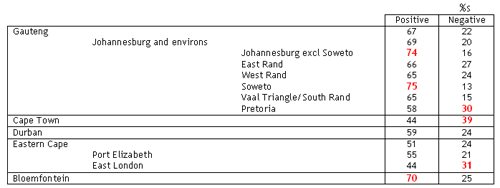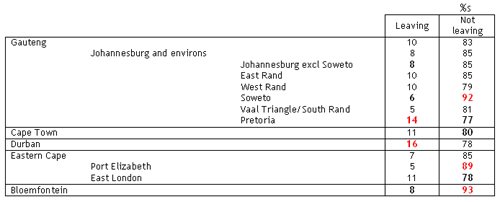
Top stories






More news


Marketing & Media
Ads are coming to AI. Does that really have to be such a bad thing?













The results indicate that 60% of respondents agreed that they were positive about South Africa and its future, 26% disagreed and 14% said that they don't know. Eleven percent said that they were thinking of leaving South Africa, 82% said that they were not and 7% said that they didn't know.
Optimism varies considerably by race:
Those who disagree that they feel positive about South Africa can be broken down as follows:
Hence, the composition of the 26% who are negative is 37% black, 36% white, 18% coloured and 9% Indians/Asians.
The much higher negativity amongst whites, coloureds and Indians/Asians correlates with a great lack of confidence in the current leadership - these groups are much more negative about both President Motlanthe (approval levels average 20% for these three groups compared with 54% for blacks) and Jacob Zuma (the incidence pf people who feel he will make a good President averages just 10% for these three groups compared with 58% for blacks).
In addition, these three groups have much greater concerns over the economy - especially inflation over the next six months (58% expect inflation to rise in the next six months, compared with 36% for blacks), the direction of business conditions over the next six months (33% are negative compared with 21% for blacks) and job prospects for the first six months of 2009 (70% feel jobs will be more difficult to find compared with 47% of blacks).
There are no differences in optimism by gender, though there is a decline amongst those aged 60 and over (48% are positive) and amongst the more wealthy (though this is partly a function of the differences across race). Amongst blacks, those whose home language is Zulu or Tswana are the most positive (78% are positive).
There are considerable differences by area, with Soweto, Johannesburg and Bloemfontein being the most positive and Cape Town, East London and Pretoria being the most negative:

Eleven percent of metro adults agreed that are thinking of leaving South Africa. There are differences by race but these are less marked than is the case for the optimism results:
Those who disagree that they feel are thinking of leaving South Africa (82%) can be broken down as follows:
Hence, the composition of the 11% who are thinking of leaving is 52% black, 28% white, 13% coloured and 7% Indians/Asians.
Interestingly, whilst the incidence of thinking of leaving is highest amongst whites, the majority of potential emigrants is black. Over the full sample, the same economic and leadership correlations occur here, with lack of job prospects being particularly an issue: however, amongst blacks, the concerns were not about leadership but were purely economic, although significantly more of those thinking of leaving said they would not be voting in the forthcoming election (28% of those thinking of leaving compared with 15% for those who are not thinking of leaving).
Whilst gender was not an issue overall, white males at 17% showed the highest response. Younger people were also more vulnerable (13% of those aged under 24 years say they are thinking of leaving compared with 9% of those aged 50 years and over). A correlation with wealth is again evident but, more concerning is that people currently at university showed a high response of 23% in terms of thinking of leaving.
Of the people who feel positive about South Africa and its future, only 9% are thinking of leaving. Of the people who are not feeling positive about South Africa, many of whom one would assume are thinking of leaving, only 16% are thinking of leaving. This is somewhat counterintuitive; however, perhaps these South Africans are willing to stay and fight out whatever it is that is making them feel negative about South Africa.
Differences by area are again very evident with Pretoria and Cape Town showing the highest likelihood of moving and Soweto, Bloemfontein and Port Elizabeth showing the most stability:

Although 26% of respondents did not feel positive about South Africa and its future, many South Africans do feel positive and that, even amongst those feeling negative, relatively few are thinking of leaving the country. However, of concern is that economic prospects, especially jobs and inflation, as well as perceptions of poor political leadership appear to be linked with thoughts of leaving the country. Also that 23% of those at university are thinking of leaving does not augur well for the worsening skills shortage.
The study was conducted amongst 2 000 adults (1260 blacks, 385 whites, 240 coloureds and 115 Indians/Asians) in the seven major metropolitan areas: it has a margin of error of under 2.5% for the results found for the total sample. The studies were conducted by TNS Research Surveys (Pty) Ltd as part of their ongoing research into current social and political issues and were funded by TNS Research Surveys. For more details, please contact Neil Higgs on 011-778-7500 or 082-376-6312. www.tnsresearchsurveys.co.za
TNS is a global market information and insight group.
Its strategic goal is to be recognised as the global leader in delivering value-added information and insights that help its clients make more effective business decisions.
TNS delivers innovative thinking and excellent service across a network of 80 countries. Working in partnership with clients, TNS provides high-quality information, analysis and insight that improves understanding of consumer behaviour.
TNS is the world's leading provider of customised services, combining sector knowledge with expertise in the areas of Product Development & Innovation, Brand & Communications, Stakeholder Management, Retail & Shopper and Customer Intelligence. TNS is a major supplier of consumer panel, media intelligence and audience measurement services.
The Kantar Group is one of the world's largest research, insight and consultancy networks. By uniting the diverse talents of more than 20 specialist companies - including the recently-acquired TNS - the group aims to become the pre-eminent provider of compelling and actionable insights for the global business community. Its 26,500 employees work across 80 countries and across the whole spectrum of research and consultancy disciplines, enabling the group to offer clients business insights at each and every point of the consumer cycle. The group's services are employed by over half of the Fortune Top 500 companies. The Kantar Group is a wholly-owned subsidiary of WPP Group plc. For further information, please visit www.kantargrouptns.com.